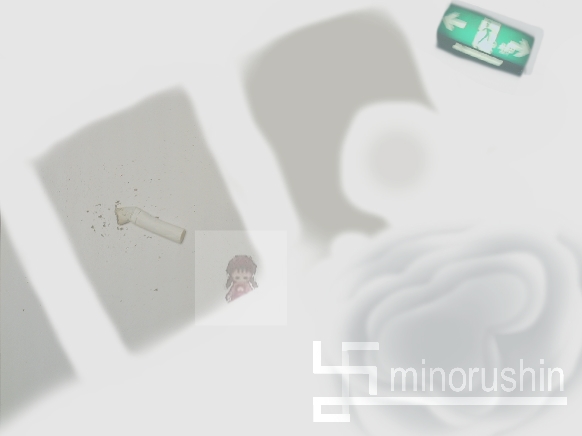>Mt.kiki No edit summary |
>Mt.kiki No edit summary |
||
| Line 1: | Line 1: | ||
[[File:Madonna_Madotsuki.jpg|link=http://yumenikki.wikia.com/wiki/Madotsuki|frame|left|Madonna_Madotsuki]] | |||
| Line 180: | Line 158: | ||
これがモナドの持つ「[http://ja.wikipedia.org/wiki/%E8%A1%A8%E8%B1%A1 <u>表象</u>]・[http://ja.wikipedia.org/wiki/%E7%9F%A5%E8%A6%9A <u>知覚</u>]」能力である(モナドは鏡である)。 | これがモナドの持つ「[http://ja.wikipedia.org/wiki/%E8%A1%A8%E8%B1%A1 <u>表象</u>]・[http://ja.wikipedia.org/wiki/%E7%9F%A5%E8%A6%9A <u>知覚</u>]」能力である(モナドは鏡である)。 | ||
| Line 190: | Line 170: | ||
'''厳密に相互に独立している(モナドには窓がない)。''' | '''厳密に相互に独立している(モナドには窓がない)。''' | ||
=====The [http://www.rbjones.com/rbjpub/philos/classics/leibniz/monad.htm#1 <u>Monad</u>]s have no [http://www.rbjones.com/rbjpub/philos/classics/leibniz/monad.htm#7 <u>window</u>]s, through which anything could come in or go out.===== | =====The [http://www.rbjones.com/rbjpub/philos/classics/leibniz/monad.htm#1 <u>Monad</u>]s have no [http://www.rbjones.com/rbjpub/philos/classics/leibniz/monad.htm#7 <u>window</u>]s, through which anything could come in or go out.===== | ||
| Line 195: | Line 176: | ||
したがってこの表象能力、他のモナドの状態との対応は、モナドの定義からいって不可能であるところの外的な「相互関係」によるものではなく、ちょうど、あらかじめ時刻を合わせた二つの時計のような意味での、[http://ja.wikipedia.org/wiki/%E7%A5%9E <u>神</u>]の[http://ja.wikipedia.org/wiki/%E5%89%B5%E9%80%A0 <u>創造</u>]の時点で予定・調整された「調和」である(予定調和)。 | したがってこの表象能力、他のモナドの状態との対応は、モナドの定義からいって不可能であるところの外的な「相互関係」によるものではなく、ちょうど、あらかじめ時刻を合わせた二つの時計のような意味での、[http://ja.wikipedia.org/wiki/%E7%A5%9E <u>神</u>]の[http://ja.wikipedia.org/wiki/%E5%89%B5%E9%80%A0 <u>創造</u>]の時点で予定・調整された「調和」である(予定調和)。 | ||
Revision as of 05:51, 22 February 2013
mado-tsuki 【窓付き】
「mado」 + 「tsuki」 = 窓付き(まどつき);fit a pane into a shoji
↓
mado 【窓】
「mado」 = 窓(まど); aperture,window
http://ejje.weblio.jp/content/%E7%AA%93
tsuki 【付き】
「tsuki」 = 付き(つき); attached 《to》
http://ejje.weblio.jp/content/%E4%BB%98%E3%81%8D
↓
roku-sou 【六窓】
「roku」 = 六(ろく);Six + 「mado」 = 窓(まど);aperture,window
「roku-sou」 = 六窓(ろくそう);Six sense-organs
http://www.weblio.jp/content/%E5%85%AD%E7%AA%93
↓〔Buddhism〕
Likened to six windows that leads to the outside world,sense-organsof Lee, tongue, nose, ears, eyes.
〔仏〕
眼・耳・鼻・舌・身・意の六根を、外界に通じる六つの窓にたとえた語。
↓六根(rok-kon) = 六窓(roku-sou)
http://ja.wikipedia.org/wiki/%E4%B8%89%E7%A7%91
| 十八界(eighteen components of perception) | ||
|---|---|---|
| 十二処(twelfth places) | ||
| 六根(six sense organs) | 六境(six objective fields of the senses) | 六識(six consciousnesses) |
| 眼(eyes) | 色(color) | 眼識(seeing) |
| 耳(ears) | 声(voice) | 耳識(hearing) |
| 鼻(nose) | 香(scent) | 鼻識(smelling) |
| 舌(tongue) | 味(flavour) | 舌識(tasting) |
| 身(body) | 触(physical feeling) | 身識(touching) |
| 意(mind) | 法(mental presentation) |
意識(reasoning) |
Madotsuki(THE MONADOLOGY)
『THE MONADOLOGY』
by Goottfried Wilhelm Leibniz translated by Robert Latta&河野与一訳)
1. The Monad, of which we shall here speak, is nothing but a simple substance, which enters into compounds. By 'simple' is meant 'without parts.' (Theod. 10.)
ライプニッツは、現実に存在するものをそれを構成しているものへと分析していくといつかはそれ以上分割できない(部分を持たない)非延長的な実体に到達するに違いないと考えた。これがモナドである。
2. And there must be simple substances, since there are compounds; for a compound is nothing but a collection or aggregatum of simple things.
ライプニッツによれば、モナドは構成されたものではなく、部分を持たない、厳密に単純な実体であるが、にもかかわらず属性として状態を持つ。
3. Now where there are no parts, there can be neither extension nor form [figure] nor divisibility.
These Monads are the real atoms of nature and, in a word, the elements of things.
この「状態」は他のすべてのモナドの状態を反映する。
すなわち、究極的には無数のモナドから、そしてただそれだけからなる現実世界全体の状態(ということはすべてのモナドの状態)に、個別のモナドの「状態」は対応する。
4. No dissolution of these elements need be feared, and there is no conceivable way in which a simple substance can be destroyed by natural means. (Theod. 89.)
属性を持たなければすべてのモナドは区別できず、複数のモナドがあるとはいえなくなるからである(不可識別者同一)。
5. For the same reason there is no conceivable way in which a simple substance can come into being by natural means, since it cannot be formed by the combination of parts [composition].
このとき、或る状態から別の状態への変化の傾向性を欲求という。
6. Thus it may be said that a Monad can only come into being or come to an end all at once; that is to say, it can come into being only by creation and come to an end only by annihilation, while that which is compound comes into being or comes to an end by parts.
これがモナドの持つ「表象・知覚」能力である(モナドは鏡である)。
7. Further, there is no way of explaining how a Monad can be altered in quality or internally changed by any other created thing; since it is impossible to change the place of anything in it or to conceive in it any internal motion which could be produced, directed, increased or diminished therein, although all this is possible in the case of compounds, in which there are changes among the parts.
しかしモナドは部分を持たない厳密に単純な実体であるから、
複合的なもの同士が関係するような意味で「関係」することはできず、
厳密に相互に独立している(モナドには窓がない)。
The Monads have no windows, through which anything could come in or go out.
Accidents cannot separate themselves from substances nor go about outside of them, as the 'sensible species' of the Scholastics used to do. Thus neither substance nor accident can come into a Monad from outside.
したがってこの表象能力、他のモナドの状態との対応は、モナドの定義からいって不可能であるところの外的な「相互関係」によるものではなく、ちょうど、あらかじめ時刻を合わせた二つの時計のような意味での、神の創造の時点で予定・調整された「調和」である(予定調和)。
Madotsuki(Microsoft Windows)
Madotsuki⇒Mado(Windows)⇒"Microsoft Windows"
mado-onna 【窓女】
窓(mado);window + 女(onna);woman
窓女(mado-onna) = 窓付き(madotsuki)
↓
onna 【女】
http://ejje.weblio.jp/content/%E5%A5%B3
↓
madonna 【マドンナ】
madonna = マドンナ(まどんな);the Madonna
http://en.wikipedia.org/wiki/Madonna
↓
Urotsuki(name)
urotsuki 【彷徨き】
urotsuki = うろつき 【彷徨き】;Wander around
http://ejje.weblio.jp/content/%E3%81%86%E3%82%8D%E3%81%A4%E3%81%8D
↓




